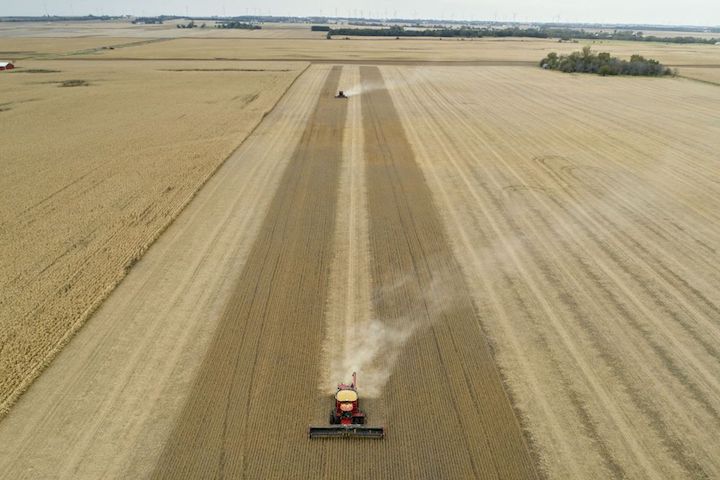Soy-hungry China gets early start buying America’s 2021 crop
China is so hungry for soybeans that it has started buying U.S. supplies from next year’s crop much earlier than usual.
The world’s top importer has been picking up American cargoes over the past week, according to people familiar with the matter, who asked not to be identified because the trades are private. While buyers bought fewer than five cargoes, purchases came earlier than the usual end of the first quarter.

China is loading up on U.S. crops from corn to soybeans to feed a hog population that’s recovering from African swine fever, a deadly pig disease, much faster than traders and analysts expected. The Asian nation’s economy is also recovering from the coronavirus pandemic, helping boost demand for food.
“To me, it is an indication they have a big purchase program for next year,” said Stephen Nicholson, a senior grain and oilseed analyst at Rabobank. “The Chinese have such a big book to buy that just needed to get started sometime, because the longer they wait, the higher the probability of running the price up on themselves.”
The soybeans will load at U.S. ports in October, the people said, adding that Chinese buyers on Monday continued to ask for more offers for supplies from the 2021-22 season. Talk about the purchases helped lift futures traded in Chicago 0.5% for a brief period, after prices started the day in the red.
There’s also speculation that China will need to turn to the U.S. to buy supplies for February as dry weather is delaying the crop in Brazil, the world’s largest producer. The price difference between Brazilian and U.S. supplies for that month is now narrow, and it’s “almost impossible” to find offers from Brazil for the first half of February, according to Chicago-based AgResource.
“The delay in Brazilian seeding combined with recent dry weather has delayed the crop and pushed back maturation,” the consultants said in a report. “This has exporters scrambling.”
“Brazil has a quality and freight advantage into China, but other world importers will be prodded to cover their soy import needs from the US.,” AgResource said.
China may also be concerned about the impact a La Nina weather event could have on crops at a time Brazilian inventories have dried up.
“Without a doubt it’s unusual for China to be going out that far ahead at this time frame,” said Tom Fritz, partner at Chicago-based EFG Group LLC. “It might be a slight hedge against a short Brazilian crop.”
Similar Stories
United States and Norway issue innovative report creating greater transparency in critical mineral supply chains
Today, the U.S. Department of Commerce and the Norwegian Ministry of Trade, Industry, and Fisheries issued a thorough, innovative report presenting our shared understanding of non-market policies and practices (NMPPs)…
View ArticleDecember CNBC/NRF retail monitor results show strong growth boosted by final Thanksgiving weekend days
Retail sales jumped strongly in December, boosted in part by two busy holiday shopping days during Thanksgiving weekend falling in the final month of the year, according to the CNBC/NRF…
View ArticleNAW presents Dirk Van Dongen Lifetime Achievement Award to Bergman, CEO of Henry Schein, Inc.
At the 2025 NAW Executive Summit Gala on January 28 in Washington, D.C.
View Article
St. Louis region’s chemical industry welcomes new investment
View Article
Navigating compliance: Adapting to changing Customs regulations in global supply chains
View Article
December 2024 U.S. Transportation Sector Unemployment (4.3%) Was the Same As the December 2023 Level (4.3%) And Above the Pre-Pandemic December 2019 Level (2.8%)
View ArticleGet the most up-to-date trending news!
SubscribeIndustry updates and weekly newsletter direct to your inbox!





